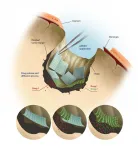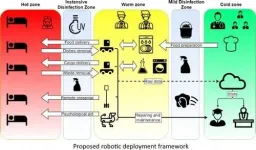New factor in the development of psoriasis discovered
Protein "c-Jun" in the dendritic cell plays a major role in promoting psoriatic skin inflammation
2021-04-19
(Press-News.org) Psoriasis is a common inflammatory skin condition. The underlying genetic factors have not yet been sufficiently researched. The skin inflammation is usually triggered by external factors such as infections or stress. A research team at the Institute of Cancer Research of the Medical University of Vienna has now managed to identify a new factor in signal transmission of the immune system that plays a major role in the development of a psoriatic episode. The scientists have shown that symptoms can be alleviated by inhibiting the "c-Jun" protein in signal transmission.
The common clinical manifestation of psoriasis is a pinkish-grey thickening of the epidermis in distinct foci of infection, so-called plaques. Biomedical research into the molecular processes involved has shown that a disruption in the normal interaction between the immune system and dermal epithelial cells is responsible for the inflammation. However, it was hitherto unclear which signalling pathways regulate the activation of immune cells, thus contributing to pathogenesis.
Function deciphered
In the recent study published in the leading journal EMBO Molecular Medicine, it was demonstrated using patient data and animal models that a protein known as "c-Jun" in a particular immune cell, the dendritic cell, plays a major role in promoting psoriatic skin inflammation. "Inhibiting signal transmission by c-Jun alleviates symptoms in the animal model," says lead author of the study Philipp Novoszel from MedUni Vienna's Institute of Cancer Research. The protein that was studied, c-Jun, belongs to a larger family of transcription factors, DNA-binding factors, known as Activator Protein-1 (AP-1). Previous studies have already identified a significant role of these AP-1 proteins in psoriasis in dermal epithelial cells but its function in immune cells was not yet clear.
"In order to answer this question, we examined whether AP-1 proteins in immune cells have a role in the pathogenesis of psoriasis. We identified elevated values of c-Jun in dendritic cells in skin sections of psoriasis patients," explains Novoszel. "To further investigate the role of c-Jun, we deactivated the gene specifically in dendritic cells." When psoriasis-like skin inflammation was now triggered, we found that the deactivation of c-Jun reduced epidermal thickening and decreased the infiltration of immune cells.
Treatment option
Pharmacological inhibition of the c-Jun activating protein, known as JNK (c-Jun N-terminal Kinase) was likewise effective. "That represents a potential treatment option, since highly effective, selective JNK inhibitors are available and could be investigated," stresses Novoszel. A further analysis using human dendritic cells showed that c-Jun controls the secretion of a key molecule in the development of psoriasis, cytokine interleukin-23 (IL-23). High values are characteristically found in psoriasis patients and lead to activation of disease-triggering T cells. "The inhibition of c-Jun-dependent signal transmission could improve the clinical picture of psoriasis by reducing pathogenic IL-23."
"Our study findings describe a previously unknown, pro-inflammatory role of c-Jun in dermal dendritic cells. This occurs, on a molecular level, through the control of the cytokine interleukin-23. A therapeutic blockade of c-Jun-JNK signal transduction might therefore be a promising therapeutic approach for the treatment of psoriasis," says the study author in summary.
INFORMATION:
ELSE PRESS RELEASES FROM THIS DATE:
2021-04-19
It has been known for about a year that minks can become infected with SARS-CoV-2. The virus had been transmitted from humans to farmed mink and mutated in infected animals. Mutations were acquired in the spike protein, which is crucial for the entry of the virus into host cells and represents the central point of attack for antibodies. These SARS-CoV-2 variants from mink were transmitted back to humans, raising concerns that minks could be a continuing source of infection of humans with SARS-CoV-2 variants with altered biological properties. Researchers at the German Primate Center (DPZ) - Leibniz Institute for Primate Research in Göttingen, Germany, have now shown that an antibody used for COVID-19 ...
2021-04-19
A simple dietary supplement reduces behavioral symptoms in mice with a genetic mutation that causes schizophrenia. After additional experiments, including visualizing the fluorescently stained dancing edge of immature brain cells, researchers concluded that the supplement likely protects proteins that build neurons' cellular skeletons.
The supplement betaine was first isolated from sugar beets and is often associated with sweetness or umami flavor. Healthy levels of betaine come from both external food sources and internal synthesis in the body. Betaine ...
2021-04-19
Up to 25 percent of global food production is lost annually due to insects, primarily beetles. For the past 500 million years, beetles have successfully spread and adapted to life around the globe and now account for one of every five animal species on Earth. Yet as far back as ancient Egypt, these tough little bugs have invaded granaries and vexed us humans by destroying our crops.
As a result, food production and an abundant use of pesticides now go hand in hand. A large share of these pesticides damage biodiversity, the environment and human health. As various pesticides are phased out, new solutions are required to target and eradicate pests without harming humans or beneficial ...
2021-04-19
Atlantic bluefin tuna have returned to UK waters and can once again be seen during the summer and autumn months.
Their numbers appear to be increasing, following a long period of absence linked to population decline, according to research led by Cefas and the University of Exeter.
Marine scientists in the UK and Ireland have analysed multiple datasets, spanning a 16-year period, to document the increase in bluefin, which arrive into the waters of the Celtic Seas and off South West England, the Scilly Isles, and North West Ireland to feed in late summer and autumn.
The research is part of the Defra-funded "Thunnus UK" research project. ...
2021-04-19
Stroke risk for patients with traumatic brain injuries is at its highest in the four months following injury and remains significant for up to five years post-injury, finds a new systematic review led by a team at the University of Birmingham.
Traumatic brain injury (TBI) is a global health problem affecting over 60 million people a year worldwide. Incidences of TBI are rising due to a range of factors including increased falls in the elderly, military conflict, sports injuries and road traffic accidents. However, advances in critical care and imaging have led to a reduction in TBI-related mortality.
Previous studies have associated TBI with a long-term risk of neurological diseases including dementia, ...
2021-04-19
There are many variants of "goblet cells" in the intestines and they seem to have different functions, according to a new study from the University of Gothenburg. The study indicates that defects in goblet cells of a particular type may be a factor contributing to ulcerative colitis, an inflammatory bowel disease.
The entire inside of our intestines is covered by a thin layer of mucus that protects the fragile mucous membrane (mucosa) from bacteria and other microorganisms. If the microorganisms repeatedly come into contact with the intestinal mucosa, inflammation and even cell changes may result. These increase the risk of intestinal cancer. In a healthy colon, the mucus layer is up to a millimeter ...
2021-04-19
Genova (Italy), 16th April 2021 - A micro-sized polymeric net wrapping around brain tumors, just like a fishing net around a shoal of fish: this is the microMESH, a new nanomedicine device capable to conform around the surface of tumor masses and efficiently deliver drugs. It has been described by the researchers of the IIT - Istituto Italiano di Tecnologia (Italian Institute of Technology) in Nature Nanotechnology. The new biomedical implant has been validated in preclinical studies that demonstrate its effectiveness for the treatment of glioblastoma multiforme.
This work has been carried out by the group of Prof. Paolo Decuzzi, head of the IIT Laboratory of Nanotechnology ...
2021-04-19
The prevalence of intellectual disabilities, which means difficulties with learning and understanding new things, is roughly 1-2% in the population. People with a severe intellectual disability need help from others in daily activities throughout their lives.
Such disabilities can be caused by genetic changes or external factors. According to estimates, roughly 2,500 genes underlie intellectual disability, of which approximately half remain unidentified.
In recent years, the diagnostics for intellectual disabilities have improved thanks to advancements in techniques that make it possible ...
2021-04-19
Language is one of the most notable abilities humans have. It allows us to express complex meanings and transmit knowledge from generation to generation. An important question in human biology is how this ability ended up being developed, and researchers from the universities of Barcelona, Cologne and Tokyo have treated this issue in a recent article.
Published in the journal Trends in Cognitive Sciences, the article counts on the participation of the experts from the Institute of Complex Systems of the UB (UBICS) Thomas O'Rourke and Pedro Tiago Martins, led by Cedric Boeckx, ICREA research professor at the Faculty of Philology ...
2021-04-19
In December 2019, a new viral infection was detected in Wuhan, China. On January 30, 2020, the World Health Organization declared the outbreak a public health emergency of international concern, and on March 11, the COVID-19 pandemic. In light of the danger that the infection poses to human personnel, the idea to utilize automation in hospitals is one of the natural solutions in healthcare.
Among the paper's five co-authors, four are working in robotics and one is an expert in medicine. The paper presents a new concept of an infectious hospital that may become a worldwide standard in the future. The idea of this appeared while the authors ...
LAST 30 PRESS RELEASES:
[Press-News.org] New factor in the development of psoriasis discovered
Protein "c-Jun" in the dendritic cell plays a major role in promoting psoriatic skin inflammation



